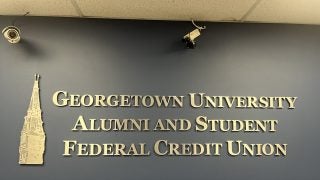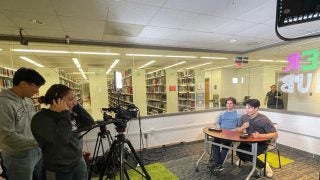Growing up in California, it is impossible to deny the many climate impacts that alter daily life. Devastating wildfires, severe floods, coastal erosion, perpetual droughts, habitat and biodiversity loss, and more all serve as constant reminders of what I believe to be the greatest collective challenge humanity will ever face.
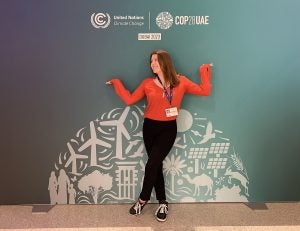 Before Georgetown, I taught middle school P.E. at the same school that I attended throughout my childhood and on the same field where I learned to push myself to new heights. But unlike my students, my classmates and I never had to retreat to our indoor classrooms during recess or wear N95 masks to enjoy our precious moments outside. Much has changed in 15 years. I remember each fire season as a kid, mainly because my dad loved talking about his work on a helicopter firefighting crew. California wildfires were always menacing, but they were rarely catastrophic. Never apocalyptic. We may be adjusting to the now-anticipated seasonal orange haze, but all children deserve to play carefree under a blue sky untainted by toxic particulates caused by human greed.
Before Georgetown, I taught middle school P.E. at the same school that I attended throughout my childhood and on the same field where I learned to push myself to new heights. But unlike my students, my classmates and I never had to retreat to our indoor classrooms during recess or wear N95 masks to enjoy our precious moments outside. Much has changed in 15 years. I remember each fire season as a kid, mainly because my dad loved talking about his work on a helicopter firefighting crew. California wildfires were always menacing, but they were rarely catastrophic. Never apocalyptic. We may be adjusting to the now-anticipated seasonal orange haze, but all children deserve to play carefree under a blue sky untainted by toxic particulates caused by human greed.
In undergrad, I double majored in environmental studies and legal studies with the hopes of becoming an environmental lawyer. I’ve had my heart set on attending the COP for years. My drive to understand and ultimately help solve the ever-expanding climate crisis eventually led me to Professor Joanna Lewis’ Climate Policy & Diplomacy course at Georgetown. Each year, Professor Lewis awards a handful of COP observer badges to Georgetown students interested in climate policy. This year, I was fortunate enough to receive a badge and realize my long-time goal of witnessing the international climate policy process firsthand. Finding out I was selected for this opportunity surpassed the moment I read my Georgetown acceptance letter. It gave me the confidence and reassurance I needed to know that, despite the many ebbs and flows of graduate school, I was on the right track.
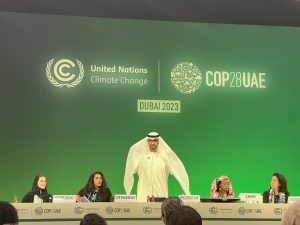 Sultan Ahmed Al Jaber speaks at a town hall.
Sultan Ahmed Al Jaber speaks at a town hall.
Arriving at COP28 was surreal – complete system overload. Words cannot describe the gargantuan nature of Expo City Dubai or the scale of this entire undertaking. I was blown away. For me, each day looked a bit different depending on the sessions I aimed to attend. The first day I began by observing the opening plenary where Sultan Ahmed Al Jaber — head of Abu Dhabi National Oil Company and president of this year’s COP — provided his opening remarks. Given his ties to Big Oil, I was quite skeptical. However, his opening speech was admittedly impressive. His words were strong, determined and clear. While I felt optimistic about ambitious outcomes at COP28, I remained concerned about fossil fuel lobbyist influence hindering much-needed climate progress. But throughout my time at COP, I saw many reasons for hope.
At MSFS, I’ve been developing somewhat of a niche in sea level rise impacts in Small Island Developing States (SIDS), including climate-induced migration. Because of my interests, I ended up spending most of my time at COP bouncing between what became my two favorite pavilions: the Ocean Pavilion and the Moana Blue Pacific Pavilion.
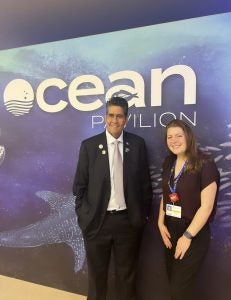 Meeting with Palauan President Surangel Whipps.
Meeting with Palauan President Surangel Whipps.
The COP28 Ocean Pavilion was sponsored by some incredible partner institutions such as Woods Hole Oceanographic Institution, Scripps Institution of Oceanography, the National Institute for Ocean Science, NOAA, etc., and was brought to COP to provide a forum where global leaders in ocean science could share their critical research with the world. It was outside the Ocean Pavilion that I got to speak with Palauan President Surangel Whipps. President Whipps was a prominent figure at COP28. His leadership and advocacy for SIDS was notable. When we spoke, President Whipps was humble and kind, taking time to share his country’s experience, listen to my passions for climate action, and offer words of wisdom on how to best support citizens of SIDS. That is one truly special aspect of COP. It isn’t far-fetched to have meaningful conversations with heads of state or well-known CEOs as a graduate student observer, or anyone else for that matter.
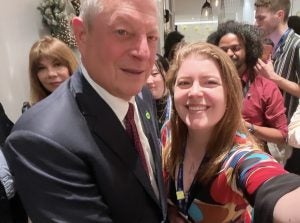 Meeting Al Gore
Meeting Al Gore
The Moana Blue Pacific Pavilion was created to showcase Pacific climate change leadership. The Pacific islands sit on the frontlines of the climate crisis, and this pavilion was an incredible display of regional strength, unity and resilience. I stopped by the Moana Pavilion at least once a day to hear from Pacific leaders, youth activists or innovative companies working to address local challenges. Between the Ocean and Moana pavilions, I gained inspiration and at least 10,000 additional steps per day.
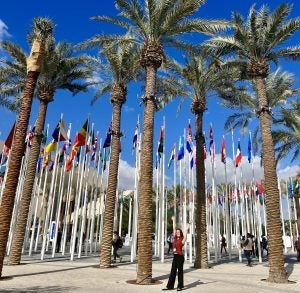
My week at COP28 was informative, stimulating, inspiring, agonizing and deeply enriching. It’s a place where you can feel the full spectrum of human emotion over one day. You might start the day on a high, thrilled to meet a head of state or one of your professional heroes and end the day wanting to hit your head on a wall as you enter hour four of draft text negotiations on the Global Stocktake where five nations are debating between a period, a colon or a comma. As tedious as the whole process seems, and often is, I gained tremendous respect for the delegations that work tirelessly to give this crisis the platform it deserves. Taking part in COP28 as an observer made me all that more motivated to return to future COPs in a more targeted capacity.
At the end of the day, this work matters. The voices that are elevated here matter. The connections that are built here matter. And incremental progress matters. It is true that environmental advocates and the most climate-vulnerable nations left this conference without their desired outcomes. We are not on track to limit global temperatures to 1.5 degrees above pre-industrial levels. But that does not mean the process isn’t working. Political will may have fallen short in Dubai, but to quote one of my personal climate heroes, Al Gore, “if you ever doubt that we as human beings have the political will to do what’s necessary to save humanity’s future, remember that political will is a renewable resource.”



